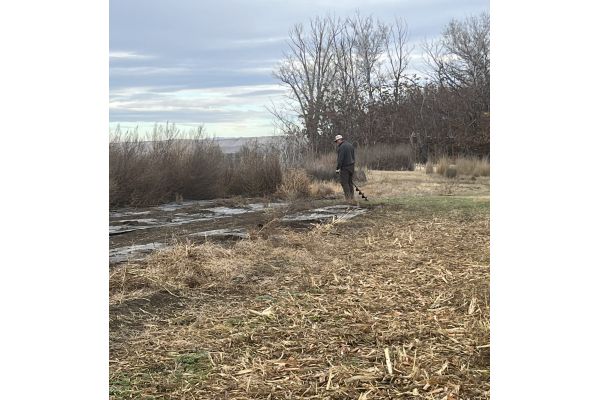NWTF, WDFW Plant Hundreds of Seedlings to Improve Sunnyside Wildlife Area

EDGEFIELD, S.C. — National Wild Turkey Federation volunteers from across Washington state rolled up their sleeves and joined Washington Department of Fish and Wildlife staff to enhance wildlife habitat on the Sunnyside Wildlife Area in Yakima, Washington.
Volunteers from the Columbia Basin Longbeards NWTF Chapter and the Yakima Basin NWTF Chapter met Friday morning at the project site, flushing an impressive 50 to 60 wild turkeys as they arrived — an encouraging reminder of the value of this work.
This workday focused on revitalizing approximately 10 acres across the Sunnyside Wildlife Area. Volunteers immediately got to work replacing shrubs in an aging 100-foot fabric strip planting area. From there, the team planted serviceberry along a brush strip on the north end, followed by stretches of willow, elderberry and chokecherry along roughly 150 feet of riverbank.
WDFW staff then laid an additional 200 to 250 feet of planting fabric, and the crew planted approximately 200 new starts of elderberry, mock orange, serviceberry, chokecherry and willow across the prepared zones. Much of this planting area sits within the overspray boundary of a nearby irrigated corn circle, offering both rich soils and dependable moisture.
Volunteers were also encouraged to see habitat investments made since last spring. After NWTF’s previous visit, site manager Noel Ferguson seeded a strip of milo and short corn. While the main corn field has already been harvested, the milo and short corn remain standing, providing critical winter food and thermal cover for turkeys, upland birds and deer. Earlier this year, wildlife area staff also seeded chufa; however, the resident turkey flock found it quickly and helped themselves to most of the seed.
By 1 p.m., the group had wrapped up a productive morning, with each volunteer contributing about three and a half hours of labor. With a small but dedicated crew, the progress was significant. Another site roughly a quarter-mile north remains on the project list, and approximately 200 additional seedlings are still staged at the wildlife area, ready to go into the ground.
“I greatly enjoyed planning out the Sunnyside Project, as it further unified our ongoing partnership with WDFW and provided the opportunity for our dedicated volunteers to gain hands-on experience with habitat restoration,” said Krista Modlin, NWTF district biologist for California, Nevada, Washington and Oregon.
The Sunnyside Project is part of an ongoing, multi-year effort led by the NWTF, WDFW and other partners to restore riparian habitat, expand food availability, improve shoreline stability and strengthen brood-rearing and winter cover for wild turkeys and a variety of game and nongame species. The work supports the long-term vision for the Sunnyside-Snake River Wildlife Area and reflects the NWTF’s commitment to quality habitat and sustainable populations.
As the Washington NWTF State Chapter continues implementing its work with the Sunnyside Project, the chapter remains committed to improving habitat across the wildlife area, strengthening its partnership with WDFW and ensuring that wild turkeys and other wildlife have the cover and forage needed to thrive.
About the National Wild Turkey Federation
Since 1973, the National Wild Turkey Federation has invested over half a billion dollars into wildlife conservation and has positively impacted over 24 million acres of critical wildlife habitat. The NWTF has also invested over $10 million into wild turkey research to guide the management of the wild turkey population and to ensure sustainable populations into perpetuity. The organization continues to deliver its mission by working across boundaries on a landscape scale through its Four Shared Values: clean and abundant water, healthy forests and wildlife habitat, resilient communities, and robust recreational opportunities. With the help of its dedicated members, partners and staff, the NWTF continues its work to provide Healthy Habitats. and Healthy Harvests. for future generations.
